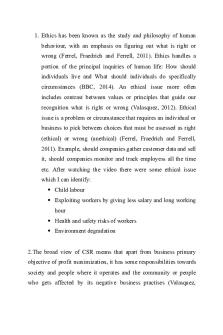Assignment 4A On Kantian Ethics PDF

| Title | Assignment 4A On Kantian Ethics |
|---|---|
| Course | Ethics |
| Institution | Technological Institute of the Philippines |
| Pages | 2 |
| File Size | 55.3 KB |
| File Type | |
| Total Downloads | 382 |
| Total Views | 597 |
Summary
Assignment 4A: On Kantian EthicsPlease make a paragraph with at least 10 sentences of each of the following questions: Describe the ways in which Kant’s system is similar to and different from utilitarianism. Between utilitarianism and Kantianism, there are few parallels. An activity is justifiable ...
Description
Assignment 4A: On Kantian Ethics
Please make a paragraph with at least 10 sentences of each of the following questions: 1. Describe the ways in which Kant’s system is similar to and different from utilitarianism. Between utilitarianism and Kantianism, there are few parallels. An activity is justifiable if it produces the greatest amount of happiness, according to utilitarianism (not just your happiness, but others as well). As a result, utilitarianism considers any behavior that does not result in the greatest happiness to be immoral. For example, utilitarianism holds that killing a mass murderer in order to save a group of people is right if it makes them happy. On the other hand, Kant does not believe that the rightness of an action is determined by its consequences. Acting on a maxim that may be applied consistently as a universal law determines the rightness of an activity. This may appear to be a difficult task. However, Kant's rationale is that if you want to do something but aren't sure if it's the proper thing to do, consider how the world would be if everyone did it. If everyone does it, the act is no longer ethically permissible, but it no longer makes sense or serves any purpose in such world. Finally, Kantianism is a deontological moral theory, whereas utilitarianism is a teleological moral theory. Kantianism and utilitarianism are ethical ideologies that express an action's ethical standard.
2. By citing example /situation, distinguish between Categorical and Hypothetical Imperatives In the ethics of 18th-century German philosopher Immanuel Kant, the hypothetical imperative is a rule of conduct that is thought to apply to an individual only if he or she seeks a specific end and has resolved (willed) to act on that desire. Although hypothetical imperatives come in a variety of shapes and sizes, the logical form is simple: “If you want X (or not want X), you should (or should not) do Y.” A hypothetical imperative could urge behavior that is similar to or distinct from that which is required by a traditional moral law. For instance, “If you want to be trusted, always tell the truth”; “If you want to get rich, steal whenever you can”; and “Avoid capsaicin if you want to avoid heartburn.” To separate them, the phrases "hypothetical" and "categorical" imperatives are used.
According to 18th-century German philosopher Immanuel Kant, the pioneer of critical philosophy, the categorical imperative is a rule of action that is unconditional or absolute for all actors, and whose validity or claim is independent of any goal or end. "Thou shall not steal," for example, is a categorical command, unlike hypothetical imperatives like "Do not steal if you want to be renowned." Kant perceived just one categorical imperative in the moral realm, which he expressed in two ways. “Act only in accordance with that maxim by which you can simultaneously will that it become a universal law” is a purely formal or logical statement that expresses the condition of rationality of conduct rather than morality, which is expressed in another Kantian formula: “So act as to treat humanity, whether in yourself or in another, always as an end and never as a means.”
3. Discuss: Never regard a person as a means, but always as an end. In this statement, the word "end" has the same meaning as the phrase "means to an end." Immanuel Kant, a philosopher, maintained that intelligent individuals should be viewed as goals in themselves rather than as a means to another goal. The fact that we are human is worth something in and of itself. If someone is an end-in-themselves, it suggests that their intrinsic worth is unaffected by other circumstances such as whether or not they are having fun or assisting others. We are valuable simply because we exist. This notion also applies to us. Rather of seeing ourselves as a tool to a purpose, we should value our inherent value. Using individuals as a tool to an end might be unethical at times. When someone says that he is being utilized as a tool to achieve a goal. In everyday conversation, ethically unfavorable judgments such as "simply exploiting" or "using" someone are common.
4. Do you agree with Kant's stand on lying? Why/not? Explain your answer I can't decide if I agree or disagree. We all know that lying is wrong, but the situation calls for it. Consider the situation where a stranger approaches you and requests your personal information. However, I'm very sure I'll agree with Kant's rules on lying. Philosopher Immanuel Kant thought that lying was always wrong. Everyone is born with a "intrinsic worth," which he refers to as "human dignity," he claims. Humans have this dignity because they are the only rational agents capable of freely making their own decisions, setting their own goals, and using reason to guide their actions. Kant emphasized that to be human, one must have the intellectual power of free choice, and to be ethical, one must respect that freedom in oneself and others. While virtue ethics is not as strict as Kant's, it argues that lying is morally wrong. Virtue ethicists focus on the creation of character, or what individuals should be, rather than assessing right and wrong action based on reasoning and what people should or should not do. Virtues are positive qualities in people that cause them to act in certain ways....
Similar Free PDFs

Assignment 4A On Kantian Ethics
- 2 Pages

Kantian Ethics
- 2 Pages

O Neill-Kantian+Ethics
- 5 Pages

Kantian Deontology
- 1 Pages

PSY10003 Ethics Assignment
- 5 Pages

Ethics Assignment 2
- 6 Pages

Professional Ethics Assignment 2
- 8 Pages

Corina assignment - business ethics
- 26 Pages

Assignment 1 ethics essay
- 12 Pages

Ethics Assignment Essay
- 2 Pages

PSY3041 Ethics Assignment
- 7 Pages

Ethics assignment 2
- 5 Pages

Values and Ethics Assignment
- 13 Pages

Business ethics. Assignment 2
- 11 Pages

Aristotle on virtue ethics essay
- 6 Pages
Popular Institutions
- Tinajero National High School - Annex
- Politeknik Caltex Riau
- Yokohama City University
- SGT University
- University of Al-Qadisiyah
- Divine Word College of Vigan
- Techniek College Rotterdam
- Universidade de Santiago
- Universiti Teknologi MARA Cawangan Johor Kampus Pasir Gudang
- Poltekkes Kemenkes Yogyakarta
- Baguio City National High School
- Colegio san marcos
- preparatoria uno
- Centro de Bachillerato Tecnológico Industrial y de Servicios No. 107
- Dalian Maritime University
- Quang Trung Secondary School
- Colegio Tecnológico en Informática
- Corporación Regional de Educación Superior
- Grupo CEDVA
- Dar Al Uloom University
- Centro de Estudios Preuniversitarios de la Universidad Nacional de Ingeniería
- 上智大学
- Aakash International School, Nuna Majara
- San Felipe Neri Catholic School
- Kang Chiao International School - New Taipei City
- Misamis Occidental National High School
- Institución Educativa Escuela Normal Juan Ladrilleros
- Kolehiyo ng Pantukan
- Batanes State College
- Instituto Continental
- Sekolah Menengah Kejuruan Kesehatan Kaltara (Tarakan)
- Colegio de La Inmaculada Concepcion - Cebu
